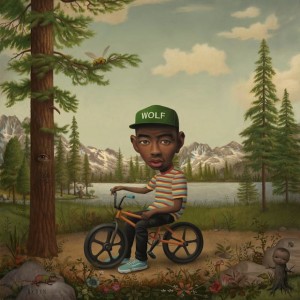Tyler, the Creator
Wolf
Odd Future, April 2 2013
Reviewed by Jon Howard
Tyler, the Creator has always been known for his shock-value lyrics, dark themes, and tight production, and with 2011’s Goblin all three of these elements reached their apex. Tyler had long stated that his next planned album Wolf would move away from the violent themes of Bastard and Goblin and be far mellower album. In fact, ‘mellow’ would probably be the best way to sum the album up as a whole in one word. The harsh beats and violent lyrics of previous tracks like “Yonkers” and “Tron Cat” are all but absent on Wolf, appearing only in a few tracks over the album’s 70 minute span. Rather, Wolf hides Tyler’s deeply rooted issues behind a mask of smooth, Summery music.
Wolf is a side-story not directly connected to the storyline of Bastard and Goblin, narrating the title character Wolf’s experiences at a summer camp named Camp Flog Gnaw. Wolf meets his rival/alter-ego Sam (“Wolf), and soon finds himself in love with Sam’s girlfriend Salem and begins seeing her behind Sam’s back (“PartyIsntOver/Campfire/Bimmer”). Once Sam finds out what’s been going on between Wolf and Salem, he vows to kill Wolf and kills Wolf’s friend Earl (“Rusty”), culminating in a fight breaking out between Sam’s and Wolf’s allies (“Trashwang”). The album closes with Dr. TC asking Wolf if he’s seen Sam anywhere. Wolf replies that if he’d seen him he would have killed him (“Lone”). Wolf provides a narrative of how innocence is destroyed. The album initially reminisces on simpler times: summer love, youthful innocence, and meeting new people at camp. But Wolf also introduces another element that bends Wolf’s innocence until it breaks entirely: conflict. The conflict between Sam and Wolf introduces tension that builds up until Wolf is forced to deal with Sam head on. By the end of the album, Wolf’s innocence has disappeared. Wolf, and thus Tyler himself, has been transformed into the deeply troubled person we see on Bastard and Goblin.
Musically, Tyler’s production has never been better. In part influenced by jazz and lounge music, the music on Wolf is some of Tyler’s best, from the smooth and mellow tracks like “Answer” and “Lone” to the more hard-hitting tracks that appeal more to the Bastard and Goblin fans like “Domo23” and “Trashwang”. One of the album’s high points “IFHY” manages to blend his new musical direction with his emotionally-charged lyrics of old while featuring a verse from Tyler’s idol Pharrell, and the result is one of the album’s strongest tracks. Although the album drags on a bit towards the middle like Goblin and Bastard, it isn’t long before it picks up momentum again.
Wolf is also full of guest appearances by contributors including previously-mentioned Pharrell and Erykah Badu who provides vocals on the excellent jazz/soul track “Treehome95” as well as contributions from many of Odd Future’s best rappers including Hodgy Beats, Casey Veggies, and Mike G, not to mention Odd Future’s prolific R&B singer Frank Ocean. Earl Sweatshirt provides his first verse on a Tyler album since Bastard on “Rusty”. While Earl’s verse doesn’t reach its full potential, it is still a welcome appearance and is integral to the storyline of Wolf. The combination of appearances by both Odd Future members and outside artists creates an album that acts as a sort of bridge between the more juvenile and violent work on Tyler’s earlier work (including his work with Odd Future) and a more emotionally developed, melodic music. Wolf appears to be a turning point in Tyler’s career, allowing him to maintain the dark content of his earlier efforts while developing and maturing as a producer. While Wolf doesn’t have as many instantly memorable tracks as Goblin, Tyler’s production is better than ever.
Recommended tracks: Jamba, Answer, Colossus, IFHY, Rusty, Lone

